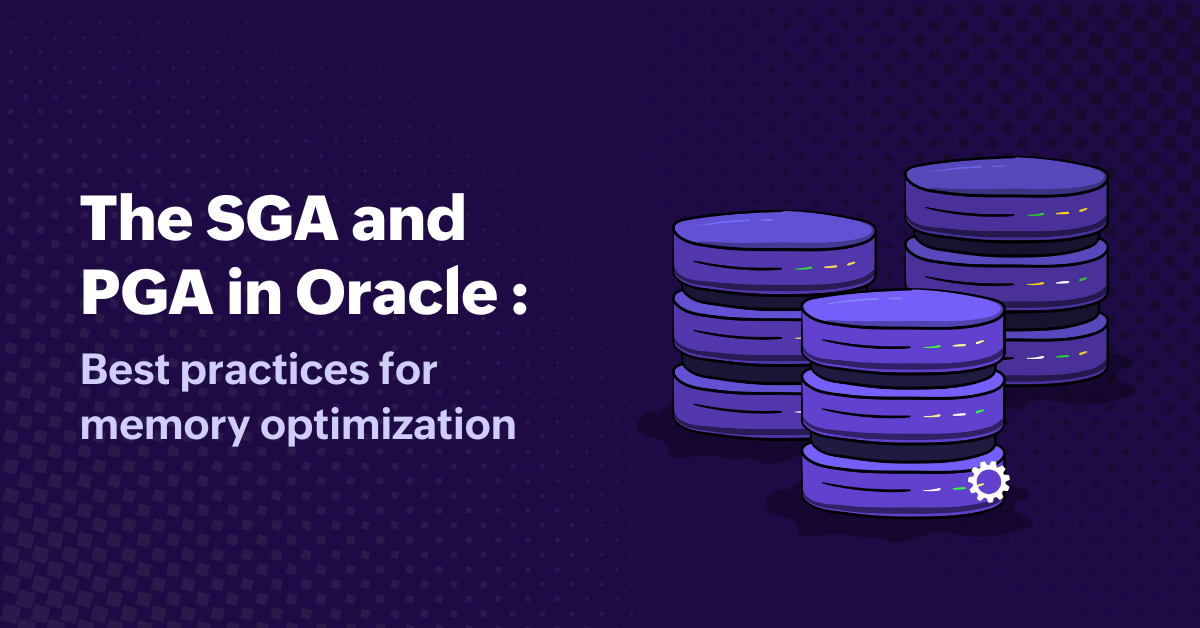How to master the SGA and PGA in Oracle databases

As we are talking about Oracle databases here, you are probably aware of the system global area (SGA) and program global area (PGA) in Oracle, which play a crucial role in database memory management. Let us explore memory allocation in detail and how to configure these for peak efficiency.
The SGA vs. PGA
The SGA and PGA in Oracle are critical for memory management. Balancing them is the key to optimization and stability.
The SGA in Oracle
The SGA in Oracle is similar to a communal workspace that is shared by all users. It includes the:
- Database buffer cache: As the name suggests, the database buffer cache stores the most frequently accessed data block, and this speeds up data retrieval.
- Shared pool: Keeping the parsed SQL statements handy, the shared pool helps avoid repeated processing.
- Redo log buffer: The redo log buffer ensures that data changes are logged for recovery.
- Large pool: This helps with backup and parallel processing.
- Java pool and Streams pool: They support Java-based operations and data replication.
The PGA in Oracle
The PGA in Oracle is kind of the opposite of the SGA; it is private to each user's session. It handles:
- Sorting and hash joins: Essential for query execution
- Session data: Stores user-specific information
- Bitmap merges: Optimizes index operations
How to allocate memory efficiently
Oracle Database memory management is crucial. Oracle offers both hands-off and hands-on memory management approaches. Which one you choose depends on your database workload and your comfort level with tuning.
Letting Oracle handle it: Oracle AMM
Imagine having a manager who handles all the allocation tasks. Automatic Memory Management (AMM) is one such manager that takes care of memory adjustments in Oracle dynamically between SQL and the PGA as needed. You can enable it with the following:
ALTER SYSTEM SET MEMORY_TARGET=<size> SCOPE=SPFILE;
ALTER SYSTEM SET MEMORY_MAX_TARGET=<size> SCOPE=SPFILE;
As this is perfect for databases with unpredictable workloads, AMM simplifies tuning and improves performance.

Fine-tuning with ASMM
Want more control while still letting Oracle do the heavy lifting? Automatic Shared Memory Management (ASMM) allows automatic SGA adjustments while the PGA remains manually set. Configure it with the following:
ALTER SYSTEM SET SGA_TARGET=<size> SCOPE=SPFILE;
ALTER SYSTEM SET SGA_MAX_SIZE=<size> SCOPE=SPFILE;
Ensure individual components like the buffer cache and shared pool are set to 0 so Oracle can allocate them dynamically. For ASMM to function correctly, SGA_TARGET must be set.
Full manual control for experts
For seasoned DBAs who know their workload inside and out, manual memory management offers the highest level of control. You can allocate exact amounts to different SGA and PGA components with the following:
ALTER SYSTEM SET SHARED_POOL_SIZE=<size> SCOPE=SPFILE;
ALTER SYSTEM SET DB_CACHE_SIZE=<size> SCOPE=SPFILE;
ALTER SYSTEM SET PGA_AGGREGATE_TARGET=<size> SCOPE=SPFILE;
We recommend this approach for databases that have predictable workloads. Manual memory management requires deep expertise and continuous monitoring. An inexperienced DBA could easily misconfigure memory, leading to severe performance problems.
Keeping an eye on performance
We have discussed a few methods of managing memory. However, whichever method you prefer, regular monitoring should not be ignored. Database monitoring tools like Site24x7 help you track the following:
- Buffer cache efficiency
- SGA and PGA usage trends
- Query execution times
- Automatic Memory Advisor recommendations
For quick manual checks, try the following:
SELECT component, current_size, min_size, max_size FROM v$sga_dynamic_components;
SELECT * FROM v$pga_target_advice;
Spotting memory bottlenecks early can save you from performance headaches down the road.
Let's get to our final say
If you think memory allocation is just about the numbers, you would be wrong. Memory optimization is about understanding your databases' needs and capacity.
Of all the above methods, whichever you prefer, the right strategy will help keep your databases running. With proactive monitoring with tools like Site24x7, you can always stay one step ahead of potential issues.
Enhanced Oracle Database monitoring with Site24x7
Site24x7 offers comprehensive monitoring for Oracle databases, providing insights into key performance indicators that impact SGA and PGA effectiveness. With Site24x7, you can proactively monitor the following critical Oracle metrics:
- Response times: Track the time it takes for the databases to respond to queries, identifying potential bottlenecks caused by memory issues.
- CPU usage: Monitor CPU utilization to determine if memory misconfiguration is leading to excessive CPU consumption.
- I/O wait times: Analyze I/O wait times to pinpoint memory-related issues that are causing slow data access.
- The number of sessions: Keep track of active database sessions to identify potential memory contention problems.
- Locks: Monitor lock contention, which can be exacerbated by inefficient memory allocation.
- Table spaces: Track table space usage to ensure sufficient storage and prevent performance degradation.
- SGA and PGA utilization: Get detailed insights into SGA and PGA memory allocation and usage as well as historical trends to optimize memory configuration.
- The buffer cache hit ratio: Analyze the efficiency of the database buffer cache to ensure frequently accessed data is readily available.
Also, utilize the benefits below with comprehensive Oracle Database monitoring:
- Alerting: Configure smart alerting based on thresholds for key metrics. Receive immediate notifications when performance degrades, allowing you to address issues proactively.
- Root cause analysis: Use Site24x7's diagnostic tools to quickly identify the root cause of performance problems.
By monitoring with Site24x7, you can gain a deeper understanding of your Oracle databases' memory usage and identify areas for optimization.
Ready to optimize your memory settings? Start monitoring your SGA and PGA with Site24x7 today!
Don't let memory bottlenecks slow down your Oracle databases. Sign up for a free trial of Site24x7 and start proactively monitoring your databases' performance.